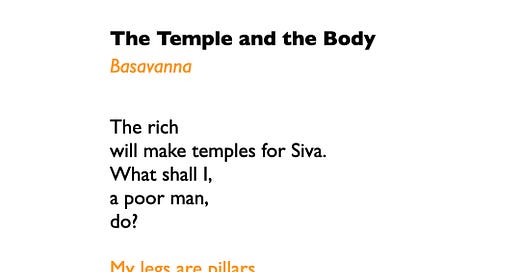Mahashivratri was a few days ago, and I had meant to share a poem on Siva, so I’ll share one today. The Vachanas are an organic, alternative strand of “protest” literature that arose out of ferment and resistance to classical orthodoxy in religion and the upper caste appropriation of divinity, around the 10th - 12th century. I have earlier shared poems from this period - Devara Dasimayya, Akka Mahadevi . I’m sharing a poem by Basavanna, a major poet, and, one might say, a leader of the medieval religious movement of Virasaivism, “of which the Kannada Vachanas are the most important text”.
I share excerpts from Ramanujan’s fabulous introduction in Speaking to Siva as context to the poem The Temple and the Body.
“If one were to choose a single poem to represent the whole extraordinary body of religious lyrics called the vachanas, one cannot better than choose [this] poem of Basavanna’s. It dramatises several of the themes and and oppositions characteristic of the protest or ‘protestant’ movement called Virasaivism.
…Indian temples are traditionally built in the image of the human body…. The different parts of a temple are named after the body parts… The temple thus carries out in brick and stone the primordial blueprint of the human body.
But in history the human metaphor fades. The model, the meaning is submerged. The temple becomes a static standing thing that has forgotten its moving originals. Basavanna’s poem calls for a return to the original of all temples, preferring the body to the embodiment…
The poem draws a distinction between making and being. The rich can only make temples. They may not be or become temples by what they do. Further, what is made is a mortal artifact, but what one is is immortal…
The Virasaiva movement was a social upheaval by and for the poor, the low-caste and the outcaste against the rich and the privileged; it was a rising of the unlettered against the literarte pundit, flesh and blood against stone.”
- A. K. Ramanujan’s introduction in Speaking of Siva
Note: Ramanujan translates the kannada Kudalasangama as ‘Lord of the Meeting Rivers’.
Subscribe to Poetly, if you are reading this not in your email.



